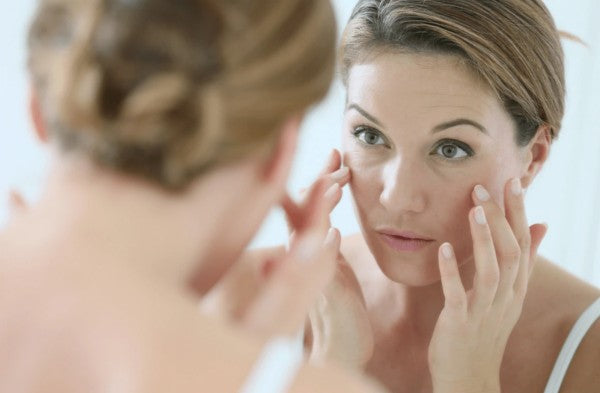Dry Skin? Get Relief with These Tips

In a nutshell, dry skin happens when the skin can’t retain water or moisture on its own. There are a few factors that can cause dry skin. The number one factor is genetics. Other factors include exposure to the cold, dry winter air, frequent bathing, itchy clothing, use of harsh soaps and detergents, chlorinated pools, aging, and certain medications and medical conditions. Dry skin is caused when the sebaceous glands do not produce enough sebum (oil). Because of this lack of sebum dry skin cannot produce enough lipids or oils needed to retain water and build a barrier that protects the skin from environmental aggressors. Without this protective barrier, skin is more prone to inflammation, dehydration, and aging concerns like fine lines and wrinkles. Disorders that impact the skin barrier, such as eczema and psoriasis or a lack of the natural moisturizing factors of the skin, can also contribute to or even worsen dry skin.
Best ingredients for dry skin-
Humectants- These substances help attract moisture. They include ceramides, glycerin, sorbitol, hyaluronic acid, urea, and lecithin.
Occlusives- These ingredients including petroleum jelly, silicone, lanolin, and various oils help seal moisture within the skin.
Emollients- These products contain oil, water, and an emulsifier to keep the two from separating. They are lighter and easier to apply than petrolatum or oils. Many skincare brands formulate moisturizers that contain both an emollient and a humectant, such as linoleic, linolenic, and lauric acids.
Niacinamide- This potent form of Vitamin B3 dramatically boosts ceramides and fatty acids. And has been shown to boost microcirculation in the dermis.
Acetyl hexapeptide-37- Improves overall hydration and increases collagen production.
Lactic Acid- One of the safest acids for not only dry skin but people who struggle with rosacea. It exfoliates and acts as a humectant. Making it perfect for dry skin.
Fatty Acids & Fatty Alcohols- work as emollients to help make skin healthier and more supple.
Panthenol- This anti-inflammatory form of Vitamin B helps activate cell turnover which helps would healing and restores the skin barrier. It is also both a humectant and emollient.
Sunflower seed oil- improvement of the moisturization of skin's outer layers with both immediate and long-lasting effects.Vitamin F- is known to hydrate the skin while also providing anti-inflammatory benefits and replenishing and restoring the skin's barrier. Look for linoleic acid (linoleic and linolenic) evening primrose oil, sea buckthorn oils - important in any treatments for reactive skin, acne, rosacea, atopic dermatitis, and eczema.
The best skincare treatments for dry skin:
Red LED Light Therapy- Improves barrier function by increasing oil production and skin perspiration to enhance the hydrolipid film (protective barrier). It has been shown to stimulate fibroblast activity and new cell growth for tighter, rejuvenated skin. This increase in activity boosts collagen and other proteins that are critical for the skin’s ability to retain hydration.
Dermaplaning- is especially effective on those with dry or rough skin texture and helps to minimize superficial acne scarring or uneven skin tone. It is also beneficial for mature skin, which tends to have a buildup of dead cells as cellular turnover slows down with age.
Oil infusion- Is an effective way to help correct barrier impairment to address dryness. This will generally improve epidermal hydration.
Foods that hydrate the skin-
While moisturizers, oils, and creams are great for topical use, treating the skin from the inside out can also help to introduce some hydration back into the skin.
- Vitamin C - helps boost skin hydration while working to prevent wrinkles. Foods filled with vitamin C include broccoli, brussels sprouts, cauliflower, pineapple, kiwi, oranges, and avocados.
- Vitamin E- protects the skin from free radicals, which can lead to early signs of aging. Almonds, sunflower seeds, spinach, avocados, trout, walnuts, sweet potatoes, butternut squash, and olive oil are some of the foods rich in vitamin E.
- Beta-Carotene - works to protect the skin against damage from UV rays. Some foods rich in beta-carotene are sweet potatoes, carrots, leafy greens, spinach, winter squash, kale, pumpkin, red peppers, peas, and broccoli.
- Healthy Fats - help to keep the skin moisturized and flexible. Avocados are one of the best foods containing healthy fats along with extra virgin olive oil, fatty fish, whole eggs, chia seeds, and dark chocolate.
- Omega-3 Fatty Acids - Works wonders on the skin. Foods high in omega-3 fatty acids include seafood, wild salmon, mackerel, chia seeds, flaxseeds, walnuts, sardines, soybeans, and olive oil.
- Zinc - can help with creating new skin cells. Seafood, dark chocolate, oysters, lamb, wheat, pumpkin seeds, and spinach are all rich in zinc.
- Potassium - fights against another form of food that could be drying your skin out: sodium. Bananas, sweet potatoes, spinach, watermelon, avocados, walnuts, yogurt, dark chocolate, tomatoes, edamame, and butternut squash are some of the numerous foods that are rich in potassium.
- Antioxidant-rich foods have numerous benefits, but they specifically protect the skin from free radicals. Dark chocolate, blackberries, blueberries, cranberries, pecans, walnuts, spinach, strawberries, and artichokes are all included in the antioxidant-rich food family.
- Vitamin F- Pecans, sunflower seeds, almonds, soy oil, flax seeds, chia seeds, hemp, and walnuts are all high in vitamin F.

